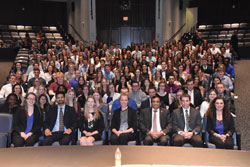The Friday just before the Thanksgiving break students were sent an email on behalf of Mary Anne Nagy, warning them about illegal file sharing within the University network. The email advised students that companies such as HBO, Sony and Warner Brothers monitor online activity and will notify the University when illegal downloads and file sharing of music, movies, games and other materials are made without permission.
According to the email, the notices from these companies list the material illegally shared by individuals and will request that the University take action against these individuals, which may include disabling their accounts.
Mary Anne Nagy, Vice President of Student Services, said that companies will directly contact the University if illegal file sharing and downloading is discovered on campus. “I will get notified from the Information Management people and they will tell me student x has been illegally downloading and they will list what has been downloaded,” said Nagy.
A primary concern coming from the University as indicated in their email is that students illegally downloading and file sharing are doing so on University computers and network.
“Illegal downloading and sharing of files utilizes resources that should be allocated for institutional purposes and exposes institutional resources and data to risks from hackers and viruses. Generally, you should assume that any music, movie, gaming software or similar file that you obtain via the Internet is copyright-protected,” according to the email.
Nagy said the University is required to send this warning email to students on an annual basis by the Higher Education Opportunity Act (HEOA).
“Every year we send the warning to students to remind them of their responsibly,” said Nagy. “The warning is also listed in the handbook.”
Edward Christensen, Vice President for Information Management, claims that there has not been an increase in file sharing so far this year. For this year, there have been seven cases while last year there was nine.
According to the University’s computer policies, appropriate use of computers includes: “the efficient and productive use of resources for their intended purposes: computation and communication appropriate to the goals of the University.”
While the email sent out may be in accordance to the HEOA, the use of University computers for activities other than meeting these goals is in violation of its policies.
Dan Fitzpatrick, literature and education major, believes this to be the University’s strong point to uphold their stance against online piracy. “We’re using University technology, so we must abide by their rules,” said Fitzpatrick. “We’re using their Wi-Fi and their computers and that’s private property. Using this is a service not a privilege.”
Though actions against file sharing are persistent, the University is fair in how they treat students caught. “We don’t charge students under the code of conduct for the first offense,” said Nagy. “We give them the opportunity to understand that they have violated the code of conduct and to modify their behavior. If they continue, we will charge them, (although it is rare that they will once it is brought to their attention.) It is important to remind people what their responsibilities are and if people do screw up, we can give them a chance to correct their behavior.”
Brandon Hayes, chemistry major, agrees with the University’s stance on preventing illegal downloading and file sharing. “I’ve been against it recently because iTunes now has self-publishing for independent artists and so now the artists will suffer from illegal downloads rather than the record companies,” said Hayes.
Dan Taylor, history and education major, feels differently. He believes that the accessing of these files by the school and the company is questionable as these files are on our personal accounts. “I don’t know if they’re just searching and accessing stolen material or all my information, including private information,” said Taylor.
In the end, however, the University’s main goal is fairness.
“The biggest thing is for people to remember that if you have downloaded a song, music video, or video game, it’s someone’s creative hard work and their intellectual property that went into making this,” said Nagy. “They expect to be paid out on the market and to be sold but if you’re illegally downloading, you’re stopping that compensation for all that work and that’s not fair. It’s our work: would you not want to be compensated for your work? Put yourself into that position.”


